 |
|
|
| OR |
|
|

|
|
|
|
|
|
|
|
|
|
|
|
|
|
|
|
|
|
|
|
|
|
|
|
|
|
|
|
|
|
William Stoddart’s life and work
|
|
This site includes William Stoddart’s biography, photos, online articles, bibliography, and more.
|
|
|
|
|
|
|
William Stoddart (June 25, 1925–November 9, 2023) was a leading author, translator, and editor of Perennialist writings who was for many years a close associate of Frithjof Schuon and Titus Burckhardt. Stoddart’s writings on religion, particularly Christianity, Islam, Hinduism, and Buddhism are considered as ideal introductions to the subject and have been lauded for their precision, simplicity, and essentiality.
William Stoddart was born in the village of Carstairs in southern Scotland on June 25, 1925. His early schooling was in that locality, and later he attended the University of Glasgow, where he studied French, German, and Spanish. Since that early start, he was an enthusiast for the treasures of Western European languages and literatures. Later, still at the same university, he graduated in medicine, with further studies at the universities of Edinburgh and Dublin.
In his youth Stoddart was raised in a simple and elementary Protestantism: the Bible, God, Christ, prayer. He discovered the Eastern religions through his father who, as a marine engineer, went frequently to India and worked with Indians, many of whom Stoddart met when their ships were in British ports. Stoddart also received elementary information about Hinduism and Islam through his school education. He was later to recall: “It never for a moment entered my head that these religions could be false. I knew instinctively that they were true, but had no idea at the time just how much the doctrine of ‘the transcendent unity of the religions’ was going to mean for me in later life. I should add that this intuition of the validity of the non-Christian religions in no way weakened my attachment to Christianity.”[1]
In 1945, at the age of 20, Stoddart discovered the writings of Ananda Coomaraswamy. This decisively changed, and gave direction to, his life. For the first time, he began consciously to understand what was meant by “objectivity” and absolute truth. In one of Coomaraswamy’s books, he came across the name of René Guénon and, having sensed that this was someone of significance, he made his first encounter with Guénon’s works in 1946.
On his first visit to Paris in 1947, he discovered, in a left-bank bookstore, the journal Études Traditionnelles, which was the vehicle for Guénon’s writings. Stoddart immediately subscribed to this journal, and bought all the back numbers that were available. He remarked: “I went through these numbers one by one, systematically reading all the articles by Guénon. Then I looked at the other articles. One evening I noticed an article entitled ‘Modes of Spiritual Realization’. It looked as if it were along Guénonian lines, so I plunged into it and, as I slowly made my way through it, I had the experience of a whole ‘Taj Mahal’ of truth—crystalline and ‘symmetrical’—being constructed before my eyes!”[2] This was to be Stoddart’s first encounter with the writings of Frithjof Schuon.
Soon after the end of the Second World War Stoddart began his Continental explorations. In 1947 he visited France and Belgium, in 1949 Spain and Portugal, and in 1950 Italy. On this last trip, he discovered, in a bookshop in Florence, the name and address (in Naples) of an Italian translator and publisher of Schuon’s writings, and decided to proceed to Naples in order to visit him. This was to be his first meeting with someone familiar with the Guénon-Schuon teachings, and this person, in addition to informing him about many things, also gave him the addresses of similarly-minded people in London. Thus began a lifelong association with the Guénon-Schuon school of intellectuality and spirituality, a school which in due course became known as the “Traditionalist” or “Perennialist” school.
Stoddart graduated in medicine in 1949. After a few years in general practice, he became a clinical research physician in the pharmaceutical industry, an occupation in which he spent most of his working life. From 1950 to 1952, he was a medical officer in the British army—military service being compulsory at that time—and was stationed in Hamburg, Germany. This was a linguistic godsend for Stoddart, as it enabled him to deepen his knowledge of the German language, something which was to stand him in good stead later in life when he translated metaphysical, poetical, artistic, and cultural works by Frithjof Schuon and Titus Burckhardt.
In 1953 Stoddart visited Frithjof Schuon in Lausanne. This was the first of a life-time of meetings with him over a period of more than four decades, for henceforth Frithjof Schuon was Stoddart’s spiritual mentor. From these days onwards Stoddart also enjoyed a close association with Schuon’s friend and collaborator Titus Burckhardt.
Stoddart traveled much during his life. From the very beginning of his travels in the 1940s and 1950s, he was acutely conscious of, and sensitive to, Western European Catholic civilization as he traveled in the Catholic countries (especially France, Spain, and Italy, but also Ireland and Poland), to 16th century Protestantism as he traveled in Northern Europe (especially Germany, Holland, and Scandinavia), and to Orthodoxy as he traveled in Eastern Europe (specifically to Greece, Russia, and Serbia).
But it was not long before Stoddart began visiting non-European religions and countries: Islam (in Morocco, Turkey, and Bosnia); Hinduism (in India); Hinayana Buddhism (in Sri Lanka), and Mahayana Buddhism and Shinto (in Japan). Indeed—apart from the spiritual life as such—Stoddart’s main interest has always been Religionswissenschaft, or “comparative religion”, as it used to be called. In the light of his readings and travels, Stoddart authored three short books: Outline of Hinduism, Outline of Buddhism, and Sufism: The Mystical Doctrines and Methods of Islam. These were published in several languages besides English and have been acclaimed for their clarity and, most characteristically, for their “synthetic” or “essentialistic” character. Stoddart also contributed articles to a variety of learned journals throughout the world.
Stoddart’s working life caused him to spend several years firstly in Manchester and then in Glasgow, but during these years he paid frequent visits to his Traditionalist friends in London, as well as continuing with his European travels. In 1968, Stoddart moved definitively to London, where he spent the rest of his working life. During many of these years he served as assistant editor of the influential British journal Studies in Comparative Religion.
In 1982, Stoddart moved to Windsor, Ontario, so as to be able to continue his personal relationship with his spiritual mentor, who had moved to the USA. Since being resident in Canada, Stoddart has remained active in writing, translating, and editing in the field of the philosophy of religion. Stoddart was enthralled by the 3,500 didactic and aphoristic poems which Schuon wrote in his native German during the last few years of his life (1995-1998). In collaboration with Schuon and his wife, Stoddart participated in the project of making this vast collection of inspired poems available in English.
Stoddart also translated into English several of Schuon’s French books, including Esoterism as Principle and as Way and Sufism: Veil and Quintessence and several of Titus Burckhardt’s German books, including Alchemy: Science of the Cosmos, Science of the Soul, Mirror of the Intellect: Essays on Traditional Science and Sacred Art, Fez: City of Islam, and Chartres and the Birth of the Cathedral. Stoddart was also editor of The Essential Titus Burckhardt: Reflections on Sacred Faiths, Art, and Civilizations. More recently he has published a collection of his writings called Remembering in a World of Forgetting: Thoughts on Tradition and Postmodernism.
In addition to his many trips to the USA, Stoddart continued to make occasional journeys to Europe and Asia. On all his journeyings Stoddart visited and made friends with Traditionalists or Perennialists in many European countries as well as in India and Japan, and especially with his colleagues and collaborators in Brazil, with whom he formed a close relationship. He also conducted a voluminous correspondence with friends and enquirers all over the world.
In his later years, Dr. William Stoddart was still active in communicating with his many friends, and received visitors from around the world. He died in Windsor, Ontario, on November 9, 2023 at the age of 98.
Adapted from Mateus Soares de Azevedo, “Biography of William Stoddart”, in William Stoddart, Remembering in a World of Forgetting: Thoughts on Tradition and Postmodernism, edited by Mateus Soares de Azevedo and Alberto Vasconcellos Queiroz (Bloomington, IN: World Wisdom, 2007), pp. 135-139.
NOTES
[1] Interview with Lynn Pollack, 2003.
[2] Ibid.
 |
|
Books written or edited by William Stoddart
Essays, Forewords, etc., by William Stoddart in other books
- The “Foreword” in The Mystery of Individuality: Grandeur and Delusion of the Human Condition by Mark Perry, 2012
- The "Introduction" in Frithjof Schuon: Messenger of the Perennial Philosophy, by Michael Fitzgerald, 2010
- Finalist in the “Biography: General” category of The USA "Best Books 2011" Awards, sponsored by USA Book News
- The "Introduction" in Men of a Single Book: Fundamentalism in Islam, Christianity, and Modern Thought, by Mateus Soares de Azevedo
- Winner in the “Religion: Comparative Religion” category of The USA "Best Books 2011" Awards, sponsored by USA Book News
- ForeWord Book of the Year Award Finalist for “Religion”
- Midwest Book Award Silver Medal for “Current Events”
- The "Foreword" in Ye Shall Know the Truth: Christianity and the Perennial Philosophy
- The "Foreword" in Siena, City of the Virgin: Illustrated, by Titus Burckhardt
- Silver Midwest Book Award for “Political Science/History”
- The "Preface" and "Introduction" in The Essential Titus Burckhardt: Reflections on Sacred Faiths, Art, and Civilizations
- The "Introduction" in Adastra & Stelle Maris: Poems by Frithjof Schuon
- The essay “The Role of Culture in Education” in
Every Branch in Me: Essays on the Meaning of Man
- The essay “Aspects of Islamic Esoterism” in Sufism: Love and Wisdom
- The essay “Mysticism” in The Underlying Religion: An Introduction to the Perennial Philosophy
|
 |
|
|
 |

| Foreword to “Frithjof Schuon: Messenger of the Perennial Philosophy” | Frithjof Schuon: Messenger of the Perennial Philosophy | Stoddart, William | | Schuon, Frithjof |
|
|

|

| The Urgent Need for Unbiased Information about Islam | What Does Islam Mean in Today's World (chapter 2) | Stoddart, William | | Inter-faith dialogue, Islam |
|

|
|

In his "Foreword" to author Harry Oldmeadow's study of the intellectual and spiritual message of Frithjof Schuon, Dr. William Stoddart (a close associate of Schuon's for many decades) situates Schuon's writings in the history of human thought, gives suggestions to new readers on how to approach Schuon's "difficult" expositions, and touches on the esoteric nature and intent of Schuon's work. Stoddart praises Oldmeadow's book for its clarity and comprehensiveness.
| Foreword to “Frithjof Schuon and the Perennial Philosophy” | Frithjof Schuon and the Perennial Philosophy (2010) | Stoddart, William | | Book Review, Perennial Philosophy, Schuon, Frithjof |

|
|
|

Stoddart examines Schuon's poems, saying they "cover every possible aspect of metaphysical doctrine, spiritual method, spiritual virtue, and the role and function of beauty… with uncanny intimacy, detail and precision." Examples are in German and English.
| The German Poems of Frithjof Schuon | The online library of articles at religioperennis.org | Stoddart, William | | Poetry |
|
|

|

| Foreword to Siena, City of the Virgin | Siena, City of the Virgin: Illustrated | Stoddart, William | | Christianity |
|

|
|

| Introduction to World Wheel Volumes I-III | World Wheel: Poems by Frithjof Schuon Volumes I-III | Stoddart, William | | Poetry |
|

|
|

| Frithjof Schuon And The Perennialist School | Remembering in a World of Forgetting: Thoughts on Tradition and Postmodernism | Stoddart, William | | Tradition |
|

|
|

| Six Fundamental Flaws In The Evolutionist Hypothesis | Remembering in a World of Forgetting: Thoughts on Tradition and Postmodernism | Stoddart, William | | Tradition |
|

|
|

| Religious And Ethnic Conflict In The Light Of The Writings Of The Perennialist School | Remembering in a World of Forgetting: Thoughts on Tradition and Postmodernism | Stoddart, William | | Tradition |
|

|
|

| Ideological obstacles to the spiritual life | Remembering in a World of Forgetting: Thoughts on Tradition and Postmodernism | Stoddart, William | | Tradition |
|

|
|
|
|
 |
|
“Stoddart has a tremendous capacity for synthesis; he is in fact a master of synthesis, an author who is able to extract the essence of the phenomena that he examines.”
—Mateus Soares de Azevedo, editor of Ye Shall Know the Truth: Christianity and the Perennial Philosophy
“The author of this book is deeply concerned with the crisis of modern man, and his book [Sufism: The Mystical Doctrines and Methods of Islam] is no mere academic study but a presentation of Sufism as one possible way of salvation. The book may be commended as presenting Sufism in a form in which it is a possible option for people in Western societies.”
—Montgomery Watt, author of Muhammad: Prophet and Statesman
“[Sufism: The Mystical Doctrines and Methods of Islam is] adorned with many good illustrations … [and] contains many important points clearly expressed.”
—Annemarie Schimmel, author of Mystical Dimensions of Islam
“A dependable exposition.... The author makes some interesting parallels with apophatic theology in Eastern Christianity.”
—Bishop Kenneth Cragg, author of The Call of the Minaret
“[Outline of Hinduism] is a sympathetic and authoritative exposition of Hinduism. It is very clear and easy to read. It will be of great help both to expatriate Hindus who wish to convey the meaning of their religion and tradition to their western-born children and to westerners seeking a clear understanding of Hinduism.”
—S. N. Nallamothu, President of the Telugu Association of North America
“[Outline of Buddhism] is a pocket encyclopedia, and the explanations which the author gives of many subtle and important doctrines are gratifyingly clear.”
—Alberto Martín, author of On the Way to Santiago
“Every chapter [of Remembering in a World of Forgetting] is a nugget of compact, condensed wisdom, but for me, the book’s crowning glory is the chapter on the six fundamental ‘Flaws of the Evolutionist Hypothesis’. If the intellectuals of our world would read this chapter thoughtfully, attentively, and open-mindedly, our entire outlook on life and the world would be set straight.”
—Huston Smith, author of The World’s Religions: Our Great Wisdom Traditions
“In our own time Tradition has found no more resolute defender than William Stoddart. This masterly collection [Remembering in a World of Forgetting] is a splendid synthesis of a lifetime of tireless endeavor on behalf of those timeless truths which signal the only way out of the darkness and confusion which characterize the modern era.”
—Harry Oldmeadow, author of Journeys East: 20th Century Western Encounters with Eastern Religious Traditions
“This rare book [Remembering in a World of Forgetting] bears the hallmark of Truth and the clarity of its distilled message is a reminder that inspires and compels change. This precious book is a reminder to us, in an age that is skeptical of objectivity, of ‘the one thing needful’.”
—M. Ali Lakhani, editor of Sacred Web
 |
|
|
Books written by William Stoddart
An Illustrated Outline of Buddhism: The Essentials of Buddhist Spirituality (World Wisdom Books, Bloomington, Indiana, 2013).
What Does Islam Mean in Today's World?: Religion, Politics, Spirituality (World Wisdom Books, Bloomington, Indiana, 2012).
Outline of Sufism: The Essentials of Islamic Spirituality (World Wisdom Books, Bloomington, Indiana, 2012).
What Do The Religions Say About Each Other?: Christian Attitudes Towards Islam Islamic Attitudes Towards Christianity (Sophia Perennis, San Rafael California, 2008).
Invincible Wisdom: Quotations from the Scriptures, Saints, and sages of All Times and Places (Sophia Perennis, San Rafael, California, 2008).
Remembering in a World of Forgetting: Thoughts on Tradition and Post-Modernism (World Wisdom Books, Bloomington, Indiana, 2008).
Hinduism and its Spiritual Masters
(first edition: Outline of Hinduism, Foundation for Traditional Studies, Oakton, Virginia 1993; second edition: Fons Vitae, Louisville, Kentucky, 2007).
Outline of Buddhism
(Foundation for Traditional Studies, Oakton, Virginia, 1998).
Sufism: the Mystical Doctrines and Methods of Islam
(first edition,1976; latest reprint: Paragon House, St. Paul, Minnesota, 1985).
Books edited by William Stoddart
Titus Burckhardt, Mirror of the Intellect: Essays on Sacred Art and Traditional Science edited by William Stoddart. Cambridge, UK: Quinta Essentia, 1987; Albany, NY: SUNY, 1987.
The Essential Titus Burckhardt: Reflections on Sacred Art, Faiths, and Civilizations, edited by William Stoddart. Bloomington IN: World Wisdom, 2003.
Religion of the Heart: Essays presented to Frithjof Schuon on his Eightieth Birthday, edited by Seyyed Hussein Nasr and William Stoddart.
Essays, Forewords, etc., by William Stoddart in other books
The Foreword in Ye shall know the Truth: Christianity and the Perennial Philosophy.
The Foreword in Siena, City of the Virgin: Illustrated.
The Introduction in Ad Astra & Stella Maris: Poems by Frithjof Schuon.
The essay “The Role of Culture in Education” in Every Branch in Me: Essays on the Meaning of Man.
The essay: “Aspects of islamic Esoterism” in Sufism: Lone and Wisdom.
The essay “Mysticism” in The Underlying Religion: An Introduction to the Perennial Philosophy.
 |
|
All rights reserved.. Contact our webmaster
for permission to reproduce.
|
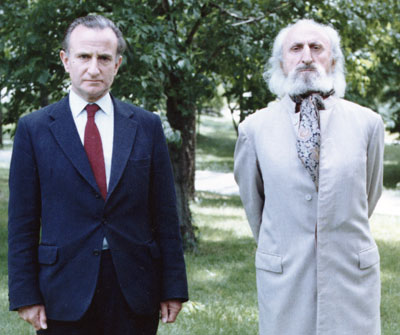
|
William Stoddart (left) with Frithjof Schuon (right)
|
| |
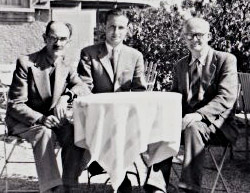
|
|
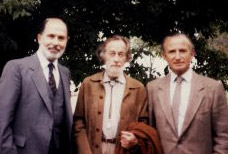
|
Traditionalist authors Angus Macnab (l), William Stoddart (c), and Bernard Kelly (r)
|
|
Traditionalist authors Seyyed Hossein Nasr (l), Martin Lings (c), and William Stoddart (r)
|
| |
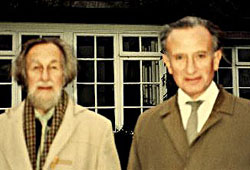
|
Martin Lings (l) and William Stoddart (r)
|
| |
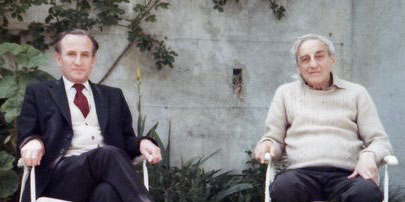
|
William Stoddart (l) with Marco Pallis (r)
|
| |
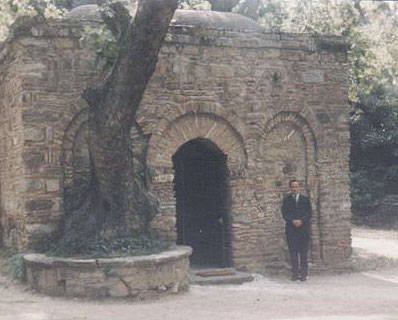
|
William Stoddart at Meryemana, the House of the Virgin Mary near Ephesus, Turkey
|
| |
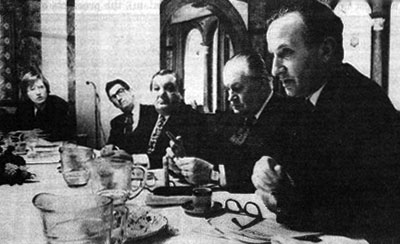
|
William Stoddart (far right) at a Christian-Islamic conference in London. Others are, from the left: unknown, Alistair Duncan, Prof. Yusuf Ibish, Francis Clive-Ross.
|
|
|
|
|
|
|
|